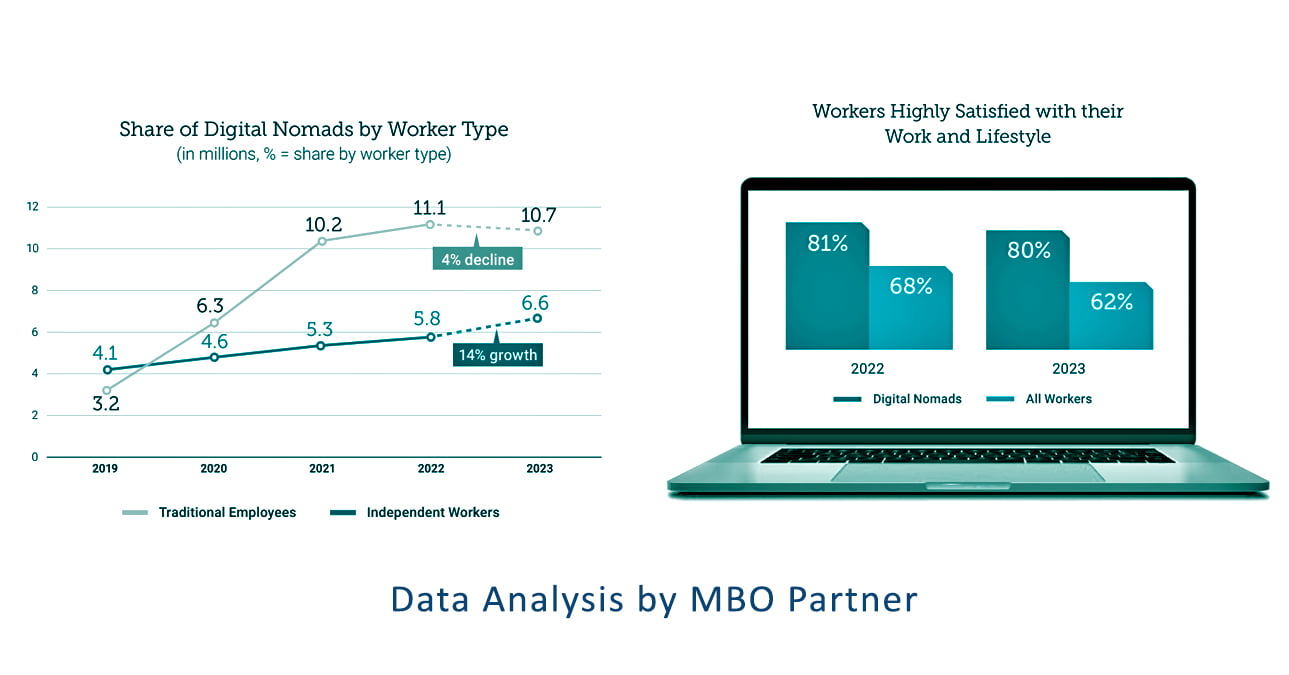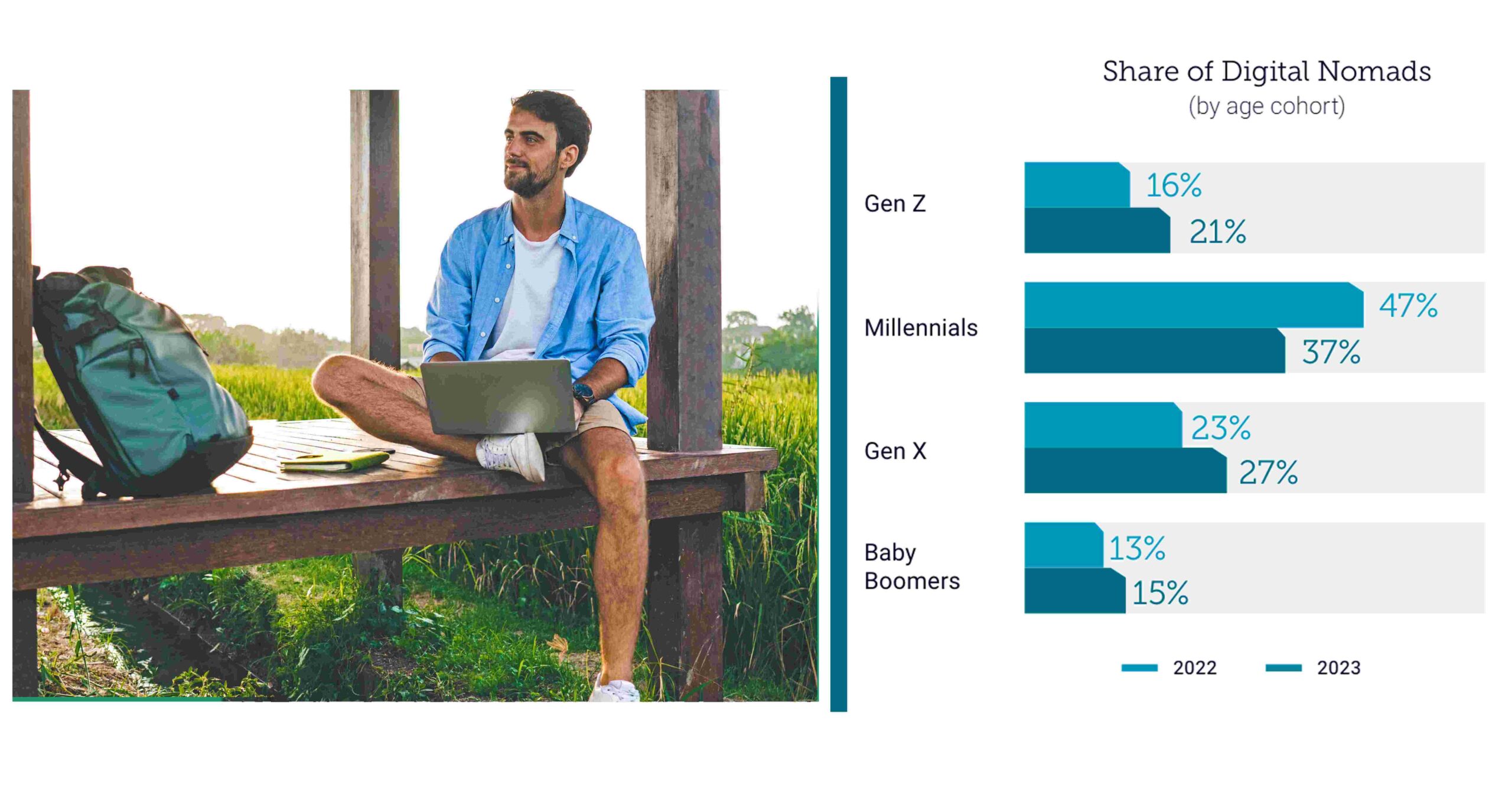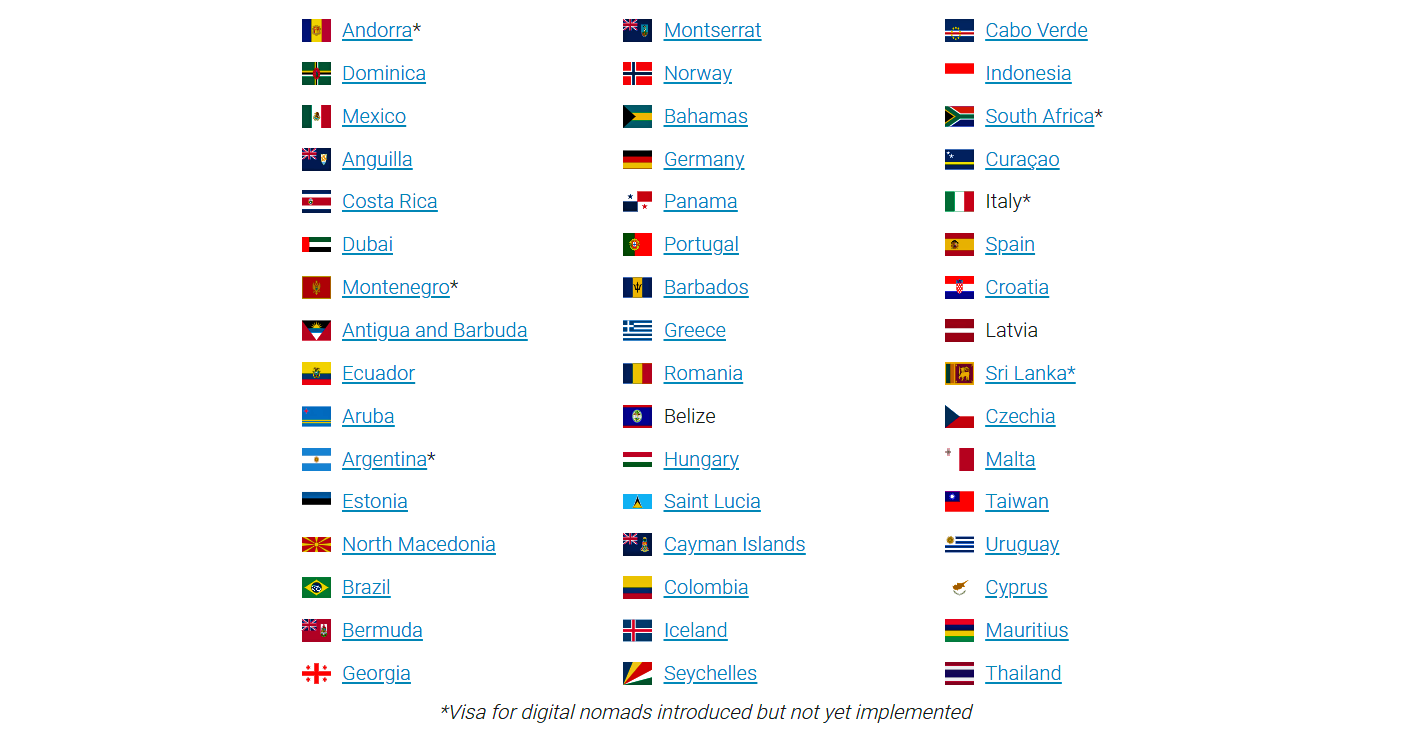Table of Contents
Table of Contents
In a world increasingly connected by technology, a growing number of people in the West, particularly in America and Europe, have ditched the office for a life of freedom and flexibility- the digital nomad lifestyle.
In recent years, this trend has gained immense popularity, not only in the west, but various other parts of world, particularly amongst professional with liberty to WFH (work from home) and freelancers. With advancements in technology, remote work has become a viable option for many professionals, allowing them to escape the traditional 9-to-5 office routine and venture on a journey of global exploration while maintaining their careers.
What is a Digital Nomad?
Digital nomads are professionals who leverage technology to work remotely while traveling the world, independent their location. Their workspace can be a chic cafe in Paris, a beachside bungalow in Bali, or a vibrant co-working space in Medellin. As long as an individual has a reliable & secured internet connection, a nomadic fulfillment of work duties and earning for a living can be maintained.
This trend isn’t entirely new, but remote work opportunities have exploded in recent years. A study by MBO Partners (offers in-depth analysis of the independent workforce), estimates that by 2035, over a billion people will classify as remote workers, with a significant portion embracing the digital nomad lifestyle.

The Rise of Digital Nomadism
The phrase was first introduced in 1997 by Tsugio Makimoto and David Manners in their publication called The Digital Nomad, portraying it as a futuristic concept achievable through technology. Over two decades later, this term has gained widespread recognition, particularly with the rise of the COVID-19 outbreak in 2020.
COVID-19 pandemic acted as a catalyst for the digital nomad movement starting mid March 2020. As companies adapted to remote work setups, employees realized their flexibility to perform jobs from anywhere with a stable internet connection. This shift had led to a surge in the number of people adopting this lifestyle, flexibility, independence from physically appearing in offices, and hence a better work-life balance.
The widespread adoption of cutting-edge tools like video conferencing and power of artificial intelligence has transformed the modern workplace, granting professionals the freedom to work productively from home or any other place.

Popular Digital Nomad Destinations
Numerous places have become popular among digital nomads, providing a mix of economic cost of living, good internet access, and lively local culture. Bali, Indonesia, has been a top choice for many, with its beautiful scenery and numerous coworking spaces. In Europe, destinations such as Lisbon, Portugal, and Barcelona, Spain, have been drawing more digital nomads because of their enjoyable weather, historical significance, and diverse expatriate communities.
In the United States, Austin, Texas, stands out as a burgeoning digital nomad hub. With its vibrant tech scene, eclectic culture, and relatively low cost of living, Austin offers an appealing blend of work and play. Similarly, Denver, Colorado, with its stunning natural surroundings and active lifestyle, has become a magnet for remote workers seeking a balance between professional productivity and outdoor adventures.
Though there are different policies amongst different countries to issue access to tourist who would like to pursue this career-lifestyle in their countries.
What is a Digital Nomad Visa?
A type of visa that allows remote workers to reside in a foreign country while maintaining employment with companies based elsewhere, is a “digital nomad visa”. Unlike traditional tourist visas, which often limit stays to 30-90 days, digital nomad visas typically permit longer stays, ranging from six months to several years, depending on the country. This visa solves the legal and logistical issues faced by digital nomads, providing them with the stability and security needed to thrive in their remote work lifestyles.
The number of nations offering special visas to remote workers is growing steadily, with new additions being made regularly. Recently, Andorra, Montenegro, Sri Lanka have been introduced in the list. Italy has become the newest member to join the ranks, announcing this unique visa program as on April 2024.

Which countries have Digital Nomad Visas
Currently there are around 50 countries where this kind of Visa is available. You can find all details in this Visa Guide site.

Benefits of being a Digital Nomad
- Flexibility in Work Schedule: Freedom to set own work hours; better work-life balance and ability to pursue personal interests and travel plans without being tied to a fixed schedule.
- Increased Productivity and Creativity: Working in diverse environments can boost creativity and productivity. Changing scenery and cultures provide new perspectives and inspiration.
- Access to Global Opportunities: Location-independency allows tapping global markets, and Diversifies income sources and potential projects.
- Cost Savings: Many popular digital nomad destinations offer a lower cost of living compared to major cities in the world. This saves expenses on rent, food, and transportation, hence increasing disposable income.
- Enhanced Work-Life Balance: The ability to travel and explore new places while working allows for a more enriched lifestyle. Integrating leisure activities and cultural experiences in routine, contributes to overall well-being and job satisfaction.
- Professional and Personal Growth: Living and working in different countries fosters personal development and resilience. You gain valuable skills such as adaptability, problem-solving, and cultural awareness, which are beneficial both professionally and personally.
- Networking and Community: Joining communities and coworking spaces provides opportunities to network with like-minded professionals. This leads to collaborations, and new business opportunities.

How to Overcome Challenges of Digital Nomadism
This mode of work might sound interesting and lucrative too, but it has some challenges.
- Time managing: Remote work a high degree time management skills. You’ll need to be proactive in setting targets and sticking to a work schedule, even amidst the distractions of travel.
- Staying motivated and disciplined: Without the structure of a traditional office, digital nomads must cultivate self-discipline to meet deadlines. Creating a dedicated workspace, setting daily goals, and maintaining a healthy work-life balance are strategies that can enhance productivity and well-being.
- Time zone differences: It can complicate communication with clients. To overcome it, establish a routine, and set boundaries between work and leisure, which will help manage productivity and avoid burnout.
- Income Stability: Freelancing or running your own business can lead to fluctuating income. Nomads need to be financially savvy and have a plan for managing their finances during lean times.
- Loneliness and Isolation: Travel & Work can make it difficult to build lasting relationships or suffer homesickness. So, individuals need to be proactive about finding communities and connecting with other remote workers in their destinations.
 Future of Digital Nomadism
Future of Digital Nomadism
As remote work continues to gain acceptance amongst companies, the digital nomad lifestyle is poised to become even more mainstream. Governments are recognizing the potential of this trend, with countries like Estonia, Barbados, Croatia, Italy introducing digital nomad visas to attract remote workers, increase tourism and vise-versa. These initiatives provide legal frameworks that make it easier for digital nomads to live and work abroad.
With the right tools, financial planning, and a proactive approach to sustainability, digital nomads can thrive in this exciting new era of work. In conclusion, the digital nomad lifestyle is more than just a trend; it is a transformative movement that empowers to live life on their own terms, and earn money online by digital means. By adopting this lifestyle, working-while-travelling is redefined in the 21st century.






